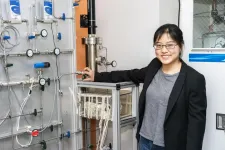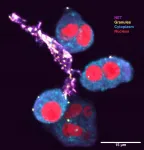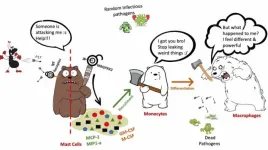(Press-News.org) According to the study, Australia, Indonesia and the USA provide the largest carbon storage potential with their coastal ecosystems. The team also calculated which countries benefit most from the coastal CO2 uptake worldwide. The different ways in which countries are affected by climate change are quantified by using the so-called social costs of carbon.
"If we take into account the differences in marginal climate damages that occur in each country, we find that Australia and Indonesia are clearly the largest donors in terms of globally avoided climate damages originating from coastal CO2 uptake, as they themselves derive comparatively little benefit from the high storage potential of their coasts," says Wilfried Rickels, who heads the Global Commons and Climate Policy Research Center at the Kiel Institute. "The U.S., on the other hand, also store a lot of carbon in their coastal ecosystems, but at the same time benefit the most from natural sinks behind India and China. In monetary terms, the three countries realize annual welfare gains of about 26.4 billion US dollar (India), 16.6 billion US dollar (China) and 14.7 billion US dollar (U.S.) thanks to global coastal ecosystems and the resulting lower climate impact costs."
The basis for the monetary calculations are the so-called social cost of carbon, which allow assessing the contribution of coastal carbon uptake in the "inclusive wealth" concept. 'Inclusive wealth' is defined as the totality of all natural and man-made capital stocks, valued with so-called shadow prices, i.e. the contributions to social welfare. Among other factors, the absolute scarcity of resources plays an important role for shadow prices. Atmospheric CO2 has a negative impact on welfare primarily through climate change. However, countries are differently affected by climate change and accordingly country-specific shadow prices are used in the study.
The analysis does not include other carbon sinks or emissions from energy and industry. When carbon emissions from energy and industry are also considered, only Guinea-Bissau, Belize, Vanuatu, Sierra Leone, Solomon Islands, Guinea, Comoros, Samoa, Madagascar, and Papua New Guinea make a net positive contribution through their coastal ecosystems, since they store more CO2 in coastal ecosystems than they emit in total.
The study also emphasizes that carbon storage is only a small part of positive impacts of coastal ecosystems for humans. "Coastal ecosystems are an essential component of marine ecosystems and are therefore particularly important for marine biodiversity and for fisheries. At the same time, they contribute to flood and coastal protection and are therefore important for adaptation to climate change," emphasizes Martin Quaas, who heads the Biodiversity Economics research group at iDiv and UL.
In any case, there is currently still a very strong focus on afforestation on land when it comes to the challenges of achieving the Paris climate goals. "Marine CO2 uptake as well as its enhancement requires more attention in the debate on net-zero greenhouse gas emissions and net-negative CO2 emissions targets," Rickels points out. Especially a possible weakening of the marine carbon sinks would require even more significant mitigation and carbon dioxide removal efforts. "The coasts, with their numerous different user groups as well as possible conflicts of use, have a special role to play here."
The natural capital approach used in the study is suitable for assessing the redistribution resulting from CO2 emissions and CO2 sinks, which, unlike existing market-based assessments, is not influenced by the stringency of the underlying climate policy. The researchers plan to explore this question in further studies.
INFORMATION:
Original publication:
Bertram, C., Quaas, M., Reusch, T. B. H., Vafeidis, A. T., Wolff, C., Rickels, W. (2021): The blue carbon wealth of nations. Nature Climate Change. DOI: 41558-021-01089-4
Many exoplanets have opaque atmospheres, obscured by clouds or hazes that make it hard for astronomers to characterize their chemical compositions. A new study shows that haze particles produced under different conditions have a wide range of properties that can determine how clear or hazy a planet's atmosphere is likely to be.
Photochemical reactions in the atmospheres of temperate exoplanets lead to the formation of small organic haze particles. Large amounts of these photochemical hazes form in Earth's atmosphere every day, yet our planet has relatively clear skies. The reason has to do with how ...
A diet rich in fermented foods enhances the diversity of gut microbes and decreases molecular signs of inflammation, according to researchers at the Stanford School of Medicine.
In a clinical trial, 36 healthy adults were randomly assigned to a 10-week diet that included either fermented or high-fiber foods. The two diets resulted in different effects on the gut microbiome and the immune system.
Eating foods such as yogurt, kefir, fermented cottage cheese, kimchi and other fermented vegetables, vegetable brine drinks, and kombucha tea led to an increase in overall microbial diversity, with stronger effects from larger servings. ...
You're as old as your immune system.
Investigators at the Stanford University School of Medicine and the Buck Institute for Research on Aging have built an inflammatory-aging clock that's more accurate than the number of candles on your birthday cake in predicting how strong your immune system is, how soon you'll become frail or whether you have unseen cardiovascular problems that could become clinical headaches a few years down the road.
In the process, the scientists fingered a bloodborne substance whose abundance may accelerate cardiovascular aging.
The story of the clock's creation will be published July 12 in Nature Aging.
"Every year, the calendar tells us we're a year older," said David ...
The cave of Satsurblia was inhabited by humans in different periods of the Paleolithic: Up to date a single human individual dated from 15,000 years ago has been sequenced from that site. No other human remains have been discovered in the older layers of the cave.
The innovative approach used by the international team led by Prof. Ron Pinhasi and Pere Gelabert with Susanna Sawyer of the University of Vienna in collaboration with Pontus Skoglund and Anders Bergström of the Francis Crick Institute in London permits the identification of DNA in samples of environmental ...
Boosting the body's own disease-fighting immune pathway could provide answers in the desperate search for new treatments for tuberculosis.
Tuberculosis still represents an enormous global disease burden and is one of the top 10 causes of death worldwide.
Led by WEHI's Dr Michael Stutz and Professor Marc Pellegrini and published in Immunity, the study uncovered how cells infected with tuberculosis bacteria can die, and that using new medicines to enhance particular forms of cell death decreased the severity of the disease in a preclinical model.
At a glance
Researchers were able to demonstrate that cells infected with tuberculosis bacteria have functional ...
Ants are omnipresent, and we often get blisters after an ant bite. But do you know the molecular mechanism behind it? A research team led by Professor Billy K C CHOW from the Research Division for Molecular and Cell Biology, Faculty of Science, the University of Hong Kong (HKU), in collaboration with Dr Jerome LEPRINCE from The Institut national de la santé et de la recherche médicale (INSERM) and Professor Michel TREILHOU from the Institut National Universitaire Champollion in France, have identified and demonstrated a novel small peptide isolated from the ant venom can initiate an immune pathway via a pseudo-allergic receptor MRGPRX2. The study ...
Rather than waiting for certainty in sea-level rise projections, policymakers can plan now for future coastal flooding by addressing existing inequities among the most vulnerable communities in flood zones, according to Stanford research.
Using a methodology that incorporates socioeconomic data on neighborhood groups of about 1,500 people, scientists found that several coastal communities in San Mateo County, California - including half the households in East Palo Alto - are at risk of financial instability from existing social factors or anticipated flooding through 2060. Even with coverage from flood insurance, these residents would not be able to pay for damages from flooding, which could lead to homelessness or bankruptcy ...
Led by Professor Robert Read and Dr Jay Laver from the NIHR Southampton Biomedical Research Centre and the University of Southampton, the work is the first of its kind.
Together they inserted a gene into a harmless type of a bacteria, that allows it to remain in the nose and trigger an immune response. They then introduced these bacteria into the noses of healthy volunteers via nose drops.
The results, published in the journal Science Translational Medicine, showed a strong immune response against bacteria that cause meningitis. Published in ...
Through a complex, self-reinforcing feedback mechanism, colorectal cancer cells make room for their own expansion by driving surrounding healthy intestinal cells to death - while simultaneously fueling their own growth. This feedback loop is driven by an activator of the innate immune system. Researchers from the German Cancer Research Center (DKFZ) and the University of Heidelberg discovered this mechanism in the intestinal tissue of fruit flies.
Maintaining the well-functioning state of an organ or tissue requires a balance of cell growth and differentiation on the one hand, and the elimination of defective cells on the other. The intestinal epithelium is a well-studied example of this balance, termed "tissue homeostasis": Stem cells ...
North Carolina State University researchers found that a four-week training course made a substantial difference in helping special education teachers anticipate different ways students with learning disabilities might solve math problems. The findings suggest that the training would help instructors more quickly identify and respond to a student's needs.
Published in the Journal of Mathematics Teacher Education, researchers say their findings could help teachers in special education develop strategies to respond to kids' math reasoning and questions in advance. They also say the findings point to the importance of mathematics education preparation for special education teachers - an area where researchers ...




